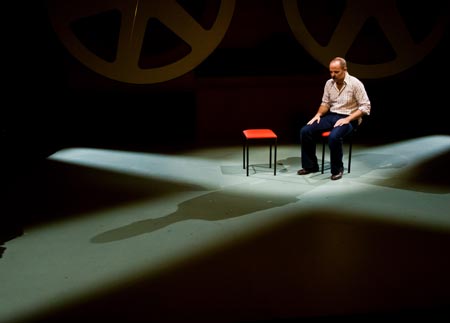Play (2013)
BÉLA PINTÉR AND COMPANY
from Hungary
PLAYWRIGHT/DIRECTOR: BÉLA PINTÉR
ArtsEmerson
Paramount Theater
Theater District, Boston
January 19-22, 2017
With ZOLTÁN FRIEDENTHAL (ISTVÁN BALLA BÁN), ESZTER CSÁKÁNYI (DR. ELVIRA SZÁDECZKY, COMRADE PÁNCZÉL), HELLA ROSZIK (KATA), ÉVA ENYEDI (TIMIKE), ZSÓFIA SZAMOSI (BEA ZAKARIÁS), BÉLA PINTÉR (IMRE TATÁR)

in “Our Secrets”
Photo: Csaba Maszaros
Courtesy of ArtsEmerson
This heartbreaking and rather bizarre drama centers around a character named ISTVÁN BALLA BÁN (ZOLTÁN FRIEDENTHAL) who is a pedophile. He is married, unable to have sexual relations with his wife, and consults a therapist, DR. ELVIRA SZÁDECZKY (ESZTER CSÁKÁNYI), in whom he confides his secret. However, it turns out that the therapist’s office is bugged by the state and authorities approach ISTVÁN, blackmail him, and force him to spy on friends and associates suspected of rebellious political activity. A colleague, IMRE TATÁR (BÉLA PINTÉR) , edits a rebel paper, and ISTVÁN becomes the state’s instrument for entrapping him.
Weirdly framed as a psychological and political tragedy with streams of commentary about music and interludes of music and dancing, this drama has the effect of a long, dark baroque tale without much let up.
The show is about two hours long, without intermission. The staging is minimalistic and features a single large set piece which is a model of a tape recorder that sets to spinning periodically. Occasionally, a violinist, a saxophone player and a couple of other musicians come upon the stage and produce lively Hungarian folk melodies and there is some animated dancing as well.
The combination of factors – the very sad tale of pedophilia told somewhat graphically, the story of the rebel editor and his family, and the parade of state officials who come in to manipulate their blackmailee – conveys its very dark and haunting themes while desperately trying to maintain an air of irony and sardonic humor. The story, however, is so stark and the staging so linear than the efforts at irony seem at best themselves ironic.
The effect of making the central character of this play a pedophile who is manipulated by the state causes one to be pulled by anguish at his wrongs and by sympathy for his political plight. At once he is an unsympathetic predator and, as well, a victim of the predatory policies of the state. Though the conception of a single character as predator and victim is interesting, it results in an odd portrayal that generates a strange mixture of responses. Disgust and sympathy blend in one’s regard for this character who emerges more as an emblem of a motivating idea than as a compelling presence. And that motivating idea is seemingly meant to be ironic, though that irony does not quite emerge.
The long passages of discussion about music seem off the beaten track and not relevant to the fundamental drama, even though the drama is motivated by political eruptions within the Hungarian folk-music scene. In that regard, the play bites off too much by trying to present this odd mixture of pedophilia and political manipulation along with a heavy dose of dialogue about music. To one sitting through a single two-hour act heavy with the prevailing major themes, that additional banter seems at best a departure.
This play provides a kind of cultural artifact, a little piece of ethnography, that represents a curious symptom of theatrical reflection of this fairly recent period of political strangulation in Hungary. As a work of drama, it is not finely tuned nor staged in a way that excessively captivates, but it does leave one with an echoed sense of what had been the appalling dour mood resulting from the political conditions of that time.
– BADMan
Leave a Reply